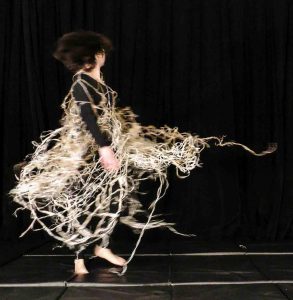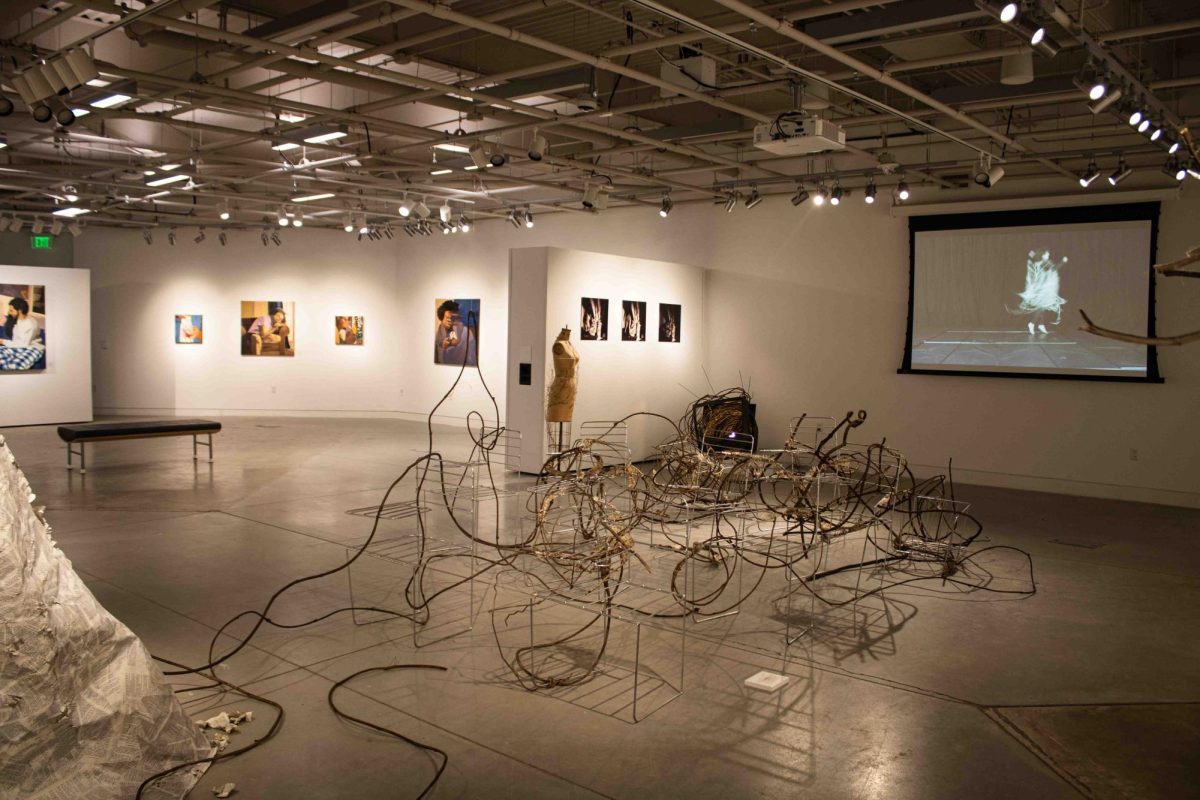From April 11th-18th, UNCA student Evie Horton shared their sculpture exhibition in the S. Tucker Cooke Gallery of Owen Hall titled, “Kudzu Bodies: The Intersection Between Kudzu and Queerness.”
Horton is pursuing their BFA with a sculpture concentration, while also minoring in environmental studies and art history.
“My concept is using Kudzu as a metaphor for queerness in the sense that both Kudzu and queerness are seen by religious and political groups as nuisances to American society,” Horton said. “I wanted Kudzu, the metaphor for queerness, to take over spaces that felt unsafe for me and others to be queer in; this includes my weavings enveloping symbols of religion, school and the media.”
To show the struggles between religion, queerness and education, Horton included their pieces titled: “The Classroom: Students #1-13, In the Words of Go,” the fishnet garment, “Held and Confined: The Duality of Being Queer,” and the performance, “Outgrew the Reconciliation.”
In “The Classroom: Students #1-13,” I referenced an old wooden school desk and cold bent the steel rod based on those measurements then welded them all together, and I wanted the school desks to appear rigid and uncomfortable and to be as uniform as possible,” Horton said. “I had the actual desk of the form too close to the back of the chair, so no one could comfortably sit in it, emphasizing the discomfort.”
Horton mainly used steel rod, paint, kudzu fibers and kudzu vines, incorporating various hardware into differing aspects of their

pieces.
“The Kudzu weavings envelope the forms representative of the school and each desk is woven individually to show individual students while also being attached to each other through various Kudzu vines. I wanted to have a more active Kudzu weaving take-over of the school since the discomfort of being queer in school and the emotional and physical violence against queer folks in school is still happening today,” Horton said.
Horton explains that growing up Catholic had an immense impact on her life, particularly her art.
“Growing up Catholic, I developed a lot of shame towards myself, my body and my queerness,” they said. “I felt this performance was a demonstration of my own journey and struggle with my religion, education and queerness.”
The intersections between education, religion and self are constant themes in Horton’s work.
“The desks are all facing in “In the Words of God,” because for me, school and religion weren’t separate; the tapestry is made up of Bible pages that were wheat-pasted on canvas,” said Horton. “I chose wheat paste as the adhesive because I wanted the pages to still have the paper-like texture and to be able to be torn and ripped by my body in the performance piece, “Outgrew the Reconciliation.’”
The Bibles Horton used for portions of their exhibit were donated to them or locally thrifted. They strategically placed pages that included homophobic verses in a way that forms a cross. The rest were cut into triangles, a reference to the Holy Trinity.
“Once fully collaged, the tapestry became heavy; the weight was intentional, as I felt weighed down by my religion and education,” said Horton.
In the piece “Held and Confined: The Duality of Being Queer,’ Horton focuses on a fishnet motif that she describes to be present throughout her work.
“For me, the process of tying knots continuously symbolizes how trauma feels like knots throughout the body,” said Horton. “Netting also catches and holds, but at the same time it confines and traps. Wearing ‘Held and Confined: The Duality of Being Queer,’ I crawled out of ‘In the Words of God,’ forming the performance, ‘Outgrew the Reconciliation.’”
Horton explains how this symbolizes the feelings of suppression by religion as a queer person, and how each piece of the installations represent the ways in which she overcomes this and embraces her identity.
“I make queer art not only to honor my identity and queerness as a whole but also my dad’s queerness,” Horton said. “He is queer now, but was not able to be out at my age.”
Horton shares that while UNCA has helped them embrace themself and who they aspire to be as an artist and individual, she has also dealt with struggles of expectations and hardships.
“I was definitely going through a hard time in my personal life during the BFA program, and honestly, it was really difficult for me to balance everything while also meeting the expectations of the program and myself,” said Horton. “I would cry after almost every critique during my first semester, and I often felt isolated, but I have grown so much since my first semester of the program and I have developed an incredible support network through my friends outside of the program, in the program and the art department and among the faculty and staff of UNCA.”
UNCA offers a BFA program that is constantly evolving, and Horton acknowledges the resources provided by the university, as well as within the Asheville community.
“Kudzu Culture and Fiber House collective created such wonderful workshops and spaces where I felt more confident in my appreciation and use of Kudzu,” they said. “The staff of The Black Mountain College Museum and Arts Center, where I had interned just before my first semester of BFA, have also been very supportive of me and have encouraged my research and concept. I am grateful for all the art department faculty who have critiqued my work, given feedback and those members of the faculty who have taken the time to get to know me and my work.”
Horton also acknowledges and thanks STEAM Studio Skillset manager Amanda Simons, who they worked closely with as a student worker and assistant instructor.
“Moving forward, I definitely want to continue installation work; I find making an immersive experience for the viewer is fascinating,” Horton said. “I want to keep making work that challenges societal norms, and also bring important issues to the viewer’s attention. Kudzu is a wonderful material, I want to continue my growth with the vine that never stops growing as well as other plants.”
Horton acknowledges that pursuing a BFA can be inaccessible to those who can’t afford to spend more time in school, and there is an extensive process to be approved to pursue that route, rather than a BA in a chosen concentration.
“I feel like the budget cuts and how financial aid will work in the future has made and will make BFA more inaccessible financially for students,” said Horton. “I wish there were scholarships available for students that would make the program more accessible, especially if you have to take a third semester.”
Students, faculty and community members attended Horton’s opening ceremony on April 11th and throughout the week that followed. She expresses her gratitude to UNCA for all they have offered, as well as to her parents for their support.
“I am proud of my parents for how much they’ve grown as well,” Horton said. “Seeing them at my show, looking at my work and the performance piece, they were really proud of me. I’m grateful that they’ve encouraged my work and me “rocking the boat” with my art.”


![Brooke Pedersen [second from the right] and Luis Reyes [right] hold banners during the Wrap The Woods event.](https://thebluebanner.net/wp-content/uploads/2025/09/ELIZABETH_PRITCHITT_IMG_3470-1200x804.jpg)















